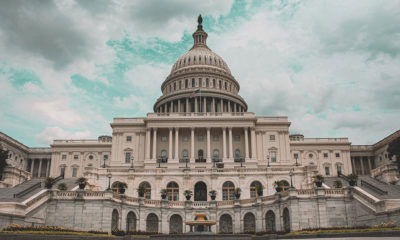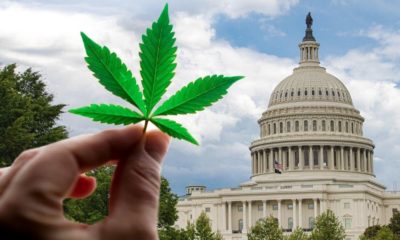
Politics
How Trump’s War on Weed Could Start on Saturday (And Why It Probably Won’t)
The most important Congressional action on cannabis — ever — is set to expire this Friday at midnight; chances are, you won’t even notice.
Depending on who you ask, the next few Saturdays will see the cannabis industry waking up to just another day in Donald Trump’s America — or the beginning of the end.
Ongoing squabbles in Congress mean the country is veering towards a temporary shutdown of the federal government. Unless lawmakers can agree on a new federal spending bill, the nation will run out of money and the government will shut down: National parks will close, in-process government loans will be frozen, and all “nonessential” government employees will be sent home.
That does not include federal lawmen at the Justice Department and Drug Enforcement Administration, who for the first time since December 2014 may have the legal ability to enforce federal drug law against state-legal medical marijuana enterprises.
For the past several fiscal years, Congress’s annual spending bill has included a budget amendment which ends America’s drug war — at least for state law-abiding medical cannabis operators.
Named for authors U.S. Rep. Dana Rohrabacher (R-Calif.) and former U.S. Rep. Sam Farr (D-Carmel), the “Rohrabacher-Farr Amendment” strips the Justice Department of all funding for prosecuting state-legal medical marijuana.
Easily the most significant action taken on marijuana policy in Congress ever, and upheld in the courts — in language so strong that observers called it a “smackdown” for the government — the amendment led one longstanding case against a California dispensary operator to be dismissed, and has stalled prosecutions in more than a dozen other cases in California and Washington.
Marijuana has more support than ever in Congress, and a renewal of the amendment — now called Rohrabacher-Blumenauer, after new co-sponsor Rep. Earl Blumenauer, a charter member of Congress’s new pro-marijuana “Cannabis Caucus” — has broad bipartisan support.
The likelihood of a government shutdown appeared less likely this week. On Wednesday, Trump and GOP leaders in Congress caved to Democrats and withdrew from the spending bill funding for the wall on the Mexican border and a provision that would have eliminated healthcare funding for low-income people.
And on Thursday, leaders from both parties seemed to come to terms on a temporary spending bill that would keep the government open for one week — pushing the deadline from April 29 to May 5 — while negotiations continue.
But if Rohrabacher-Blumenauer is rejected, or if the final deadline comes and goes without a new budget and the government shuts down, those stalled prosecutions could proceed, as veteran public defender David Feige, writing in Slate, observed.
But much, much worse than Obama-era prosecutions proceeding is the prospect of Attorney General Jeff Sessions — who has made his dogmatic opposition to legal cannabis crystal-clear — with broad new authority to ramp up the drug war to Reagan-era highs and a DEA with “the green light to go after the medical-marijuana operations that serve 197 million Americans,” as The Nation reported last week.
Or, not. If Rohrabacher-Blumenauer doesn’t pass, “the apocalypse isn’t coming,” said Sam Kamin, the Vicente Sederberg professor of marijuana law and policy at the University of Denver’s Sturm College of Law, in an interview Wednesday with Cannabis Now.
“It would be a symbolic reversal, yes,” he said. “But if [a crackdown] does come, this will be a symptom, not a cause.”
Recreational Still at Risk
First, the amendment only affects medical marijuana.
“None of the funds made available in this Act to the Department of Justice may be used to enforce federal prohibitions involving the use, distribution, possession, or cultivation of marijuana for medical purposes,” it reads (emphasis ours).
While Sessions has had nothing good to say about medical cannabis — it’s “hyped maybe a bit too much,” he said in March — even he has “drawn a distinction between medical and recreational,” Kamin said.
(Perhaps even Sessions has seen the polls that show close to 90 percent of Americans support providing cannabis to sick people.)
In other words, there’s nothing currently stopping a Trump Administration crackdown on state recreational marijuana legalization. And since the amendment only protects law-abiding medical cannabis operations, there’s nothing to stop a DEA crackdown on grows operating outside of state law, as a series of raids of cultivation sites in Colorado last fall demonstrated.
(Those raids were also the final blow for Colorado’s permissive home-grow allowances. This spring, state lawmakers reduced a 99-plant limit for legal home cannabis cultivation to 12 plants.)
At the same time, Sessions will be just as ill-prepared to start a crackdown on April 29 or May 5 as he is now. There are no more than 4,000 DEA agents worldwide. To take any effective action against the marijuana businesses operating in the 28 states where some form of the drug is legal would require massive cooperation from state and local law enforcement.
A federal crackdowns would require eager partners from state and local law enforcement. And in legal states, tax revenue from cannabis is swelling the budgets of police departments as well as schools and public health — and sheriffs and district attorneys are elected officials.
Rohrabacher-Blumenauer “is built on the concept of states’ rights,” said Amanda Reiman, a lecturer on drug policy at the University of California, Berkeley and a former official with the Drug Policy Alliance, one of the key groups behind California’s successful legalization initiative.
“Most of the enforcement on the street level is carried out by the states, with the feds only intervening when interstate commerce or large amounts of a drug are involved,” she said.
A massive, nationwide marijuana crackdown would also be enormously unpopular — with conservatives.
Amendment sponsor Dana Rohrabacher is a conservative Republican in Orange County, California — one of the deep-blue state’s few reliably Republican areas. And freshman Congressman Matt Gaetz (R-Florida) — who represents one of the most conservative districts in the country, and who ended a February town-hall meeting on healthcare by leading “Make America Great Again” chants — is the sponsor of a separate bill that would reschedule cannabis from Schedule I to Schedule III.
It would also require Sessions to have U.S. attorneys on the ground, and like with other key positions in the Trump Administration, the attorney general has yet to fill a single vacant U.S. attorney position after a mass purge earlier in the year. If Jeff Sessions wants to burn America’s marijuana industry to the ground, he has a long way to go before he can even start; he hasn’t even bought the matches yet.
The Scare Factor
But if the amendment does go away, the cannabis industry landscape could change dramatically, even if Sessions and the DEA stand idly by and don’t do a thing. Investors and entrepreneurs planning massive, million-square foot cannabis processing facilities would likely think twice — and decide to put their money and efforts somewhere a little less risky.
What limited legal protections the marijuana industry enjoys are tenuous at best. Along with the Rohrabacher-Blumenauer amendment, cannabis businesses cite the so-called “Cole Memo,” a nonbinding Obama-era Justice Department directive that calls for DOJ resources to focus on organized crime and marijuana operations that affect children.
Though even AG Sessions has thus far respected the memo, it’s far from a solid protection — it is, after all, non-binding.
“A change in federal policy [such as the amendment’s expiration] would absolutely change everyone’s plans,” says Brendan Hallinan, a San Francisco-based marijuana business attorney. “We’ve seen this before, with other ‘green rushes.’ People rush in — but if something happens with the feds, people flee the space.”
The truth is, even if the amendment passes, Congress will still need to make significant strides for marijuana to enjoy a semblance of real security.
Much Work to Be Done
Newcomers to the industry with backgrounds in other businesses — like real estate or technology — “are coming in with the presumption that this is now OK to do,” Hallinan said. “Things really haven’t yet changed. Realistically, we’re in the same place we’ve been all along with the feds.”
That is: marijuana businesses can’t bank, can’t claim many business expenses on their taxes and can’t be assured that investor capital, out-in-the-open grow facilities and enormous stocks of product won’t be summarily seized by the federal government under asset forfeiture laws.
There are a record number of marijuana-related reform bills in Congress that would solve some of these outstanding issues. Some, like Gaetz’s plan to remove marijuana from Schedule I of the Controlled Substances Act and move it to Schedule III, are carried by hardcore Trump Republicans.
But none of these bills have yet been scheduled for a committee hearing. If the amendment passes, great — it’ll be the first and smallest step Congress can possibly take. And federal lawmakers’ reluctance to push this issue forward — despite an unmistakable public mandate, and a near-consensus from every expert and elected official (aside from the hardliners like Sessions selected for Trump’s cabinet) that current policy isn’t workng — continues to confound.
“There’s this irony,” Kamin said. “There are 28 states now with some form of medical marijuana. That’s an almost veto-proof majority of senators, yet you see very few electeds stretch their necks out for marijuana law reform.”
“It does seem to be at a tipping point, but it’s a tipping point that’s been postponed by Trump.”
TELL US, are you worried about the possible fallout if Rohrabacher-Blumenauer isn’t renewed?























